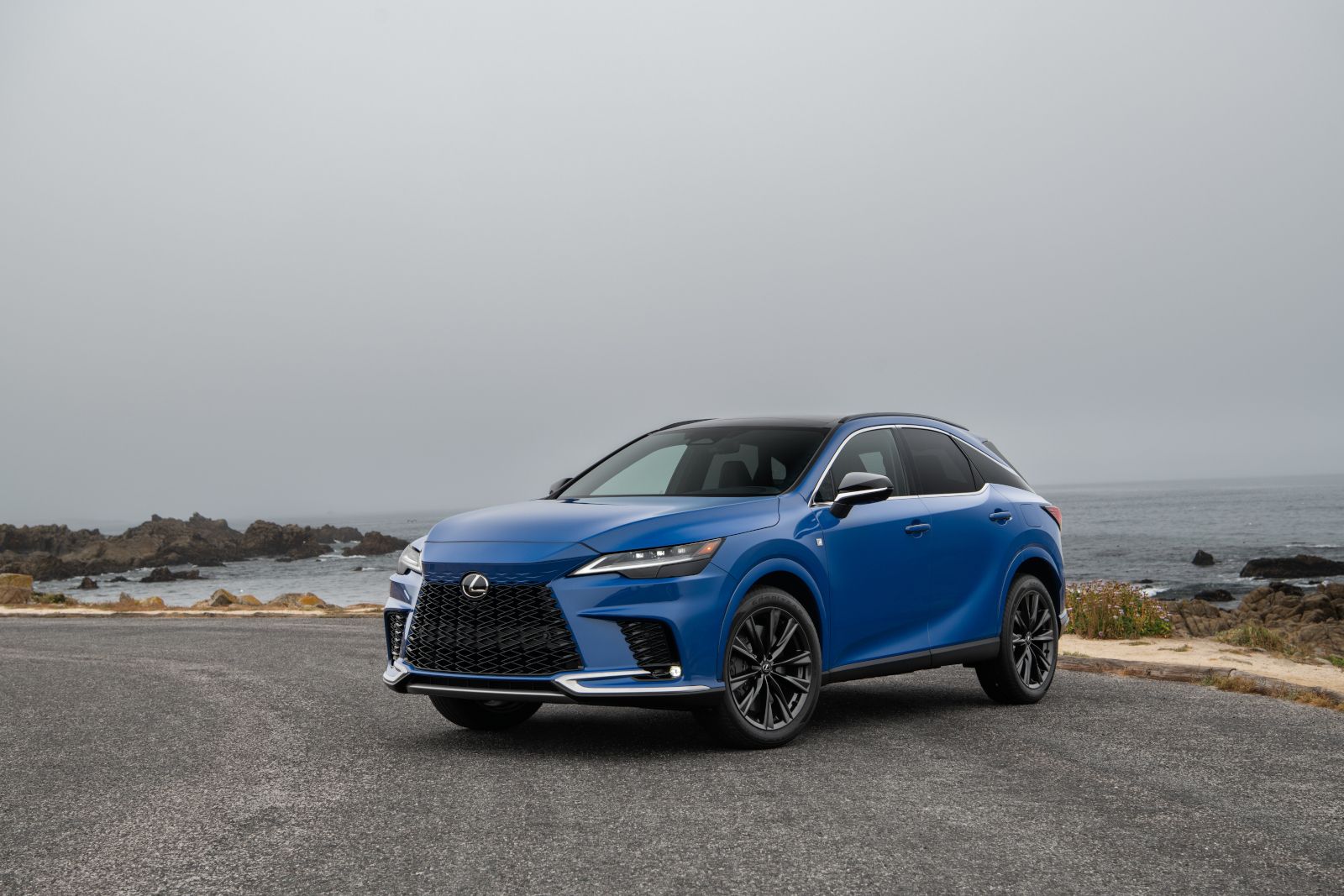Gas, Hybrid, or Plug-In? Decoding the 2025 Lexus RX Powertrain Options for Canadian Drivers
August 08 2025,

Choosing the right RX powertrain affects daily driving, fuel costs, and long-term satisfaction. The 2025 Lexus RX lineup offers four distinct powertrain options, each targeting specific driving patterns and priorities. Understanding these differences helps narrow your decision before stepping into the dealership.
Canadian RX buyers can choose from conventional gas power, two different hybrid systems, and a plug-in hybrid option. Each powertrain delivers the luxury and comfort expected from Lexus, but with different strengths for different lifestyles.
RX 350: Traditional Turbocharged Power
The RX 350 builds around a 2.4-litre turbocharged four-cylinder engine paired with an eight-speed automatic transmission and electronically controlled full-time all-wheel drive. This setup delivers 275 peak horsepower and up to 317 lb-ft of torque while achieving 9.9L/100km combined fuel efficiency.
This powertrain suits drivers who prioritize immediate throttle response and familiar driving characteristics. The turbo engine provides strong acceleration for highway merging and passing, while the eight-speed automatic offers precise gear selection during varied driving conditions.
The conventional engine operates with predictable power delivery patterns that many drivers prefer. No learning curve exists for operation—simply start and drive like any traditional vehicle.
Best for: Drivers who want conventional engine operation, occasional towing needs, or maximum simplicity without hybrid complexity.
RX 350h: Efficient Self-Charging Hybrid
The RX 350h features a self-charging hybrid system built around a 2.5-litre four-cylinder engine and electronically controlled continuously variable transmission. This powertrain generates 246 system horsepower while achieving an efficient 6.5L/100km combined rating.
The AWD-e system provides traction without mechanical complexity, using electric motors to control power distribution. This setup excels during stop-and-go driving, where the electric motor handles low-speed operation while the gasoline engine remains off.
The hybrid system automatically switches between electric-only operation, gasoline operation, and combined power based on driving demands. This seamless operation requires no driver input while maximizing fuel efficiency.
Best for: Daily commuters, budget-conscious buyers seeking lower fuel costs, or drivers who want hybrid efficiency without plug-in requirements.
RX 500h: High-Performance Hybrid

The RX 500h features Lexus's first one-motor hybrid system, combining a 2.4-litre turbocharged four-cylinder engine with a high-output electric motor, inverter, and reduction gearbox. Paired with a six-speed automatic and DIRECT 4 all-wheel drive, this system generates 367 system horsepower and up to 406 lb-ft of torque.
Despite the substantial power increase, fuel efficiency remains reasonable at 8.6L/100km combined. The DIRECT 4 system optimizes power distribution between front and rear wheels based on driving conditions, providing both performance and traction control.
The system can send up to 100% of power to the rear wheels during acceleration for optimal traction, or distribute power 80:20 to 0:100 during cornering for precise handling.
Best for: Performance-oriented drivers who want hybrid efficiency with sports car acceleration, or those who frequently drive challenging terrain requiring maximum traction.
RX 450h+: Plug-In Hybrid Freedom
The RX 450h+ leverages plug-in hybrid technology, combining a 2.5-litre inline four-cylinder engine with an electronically controlled continuously variable transmission and high-capacity battery. This setup allows both electric-only operation for daily commuting and hybrid operation for longer trips.
The RX 450h+ provides an estimated electric-only range of 60 kilometres—enough for many Canadian daily commutes without using gasoline. When the battery depletes, the vehicle seamlessly switches to self-charging hybrid electric mode.
The system can be fully charged in as little as 2.5 hours using Level 2 charging. For longer trips, the gasoline engine and hybrid system provide extended range without charging stops.
Best for: Drivers with predictable daily routes within electric range, those with home charging capability, or buyers who want electric operation for weekday commuting and hybrid capability for weekend adventures.
2025 RX Powertrain Comparison
|
Model |
Engine |
Transmission |
Power |
Fuel Economy |
Best Use Case |
|---|---|---|---|---|---|
|
RX 350 |
2.4L Turbo |
8-Speed Auto |
275 hp |
9.9L/100km |
Traditional power preference |
|
RX 350h |
2.5L + Hybrid |
eCVT |
246 hp |
6.5L/100km |
Daily commuting efficiency |
|
RX 500h |
2.4L Turbo + Hybrid |
6-Speed Auto |
367 hp |
8.6L/100km |
Performance with efficiency |
|
RX 450h+ |
2.5L + PHEV |
eCVT |
304 hp |
6.7L/100km* |
Electric commute + road trip |
*Combined rating with battery depleted
Making the Right Choice

Your driving patterns determine the ideal powertrain. Urban commuters benefit most from the RX 350h's efficiency and low operating costs. Weekend adventure seekers appreciate the RX 500h's power and advanced traction control. The RX 450h+ works best for drivers with consistent daily routes and home charging access.
The conventional RX 350 remains ideal for buyers who prefer traditional engine operation or those who drive extensively in rural areas where charging infrastructure remains limited.
All powertrains include standard all-wheel drive, though the systems differ in operation. The RX 350 uses electronically controlled full-time AWD with mechanical components. The hybrid models use electric AWD systems that respond faster to changing road conditions.
All-Wheel Drive Differences
Each RX powertrain uses different all-wheel drive technology. The RX 350 employs electronically controlled full-time AWD with mechanical components. The RX 350h uses AWD-e with electric rear motor assistance. The RX 500h features DIRECT 4, Lexus's most advanced system that actively optimizes power distribution for performance and efficiency.
The RX 450h+ uses AWD-e similar to the 350h but with additional power from the plug-in battery system. These electronic systems in hybrid models respond faster to changing road conditions than conventional mechanical systems.
Fuel Cost Reality Check
Current Canadian fuel prices make hybrid efficiency valuable for high-mileage drivers. The RX 350h's 6.5L/100km rating can save substantial money compared to the RX 350's 9.9L/100km consumption. The RX 500h splits the difference while providing significantly more power.
The RX 450h+ offers the lowest operating costs for drivers whose daily needs fall within electric range, essentially eliminating fuel costs for routine commuting while providing hybrid backup for longer trips.
Standard Features Across All Models
Regardless of powertrain choice, every RX includes Lexus Safety System+ 3.0, premium interior materials, and advanced technology features. The luxury experience remains consistent—only the driving dynamics and efficiency change between powertrains.
Each model offers multiple trim levels that add specific luxury and technology features, allowing buyers to customize their RX experience beyond powertrain selection.
Visit Lexus of Lakeridge in Ajax, ON to experience each RX powertrain option and determine which system matches your driving needs and priorities.
Quick Decision Guide:
- Choose RX 350 if: You prefer conventional engines and simple operation
- Choose RX 350h if: Daily efficiency matters more than maximum power
- Choose RX 500h if: You want both performance and reasonable fuel economy
- Choose RX 450h+ if: Your commute fits within electric range and you have charging access
Explore the complete 2025 RX lineup at Lexus of Lakeridge in Ajax, ON and find the powertrain that transforms your daily drive.


